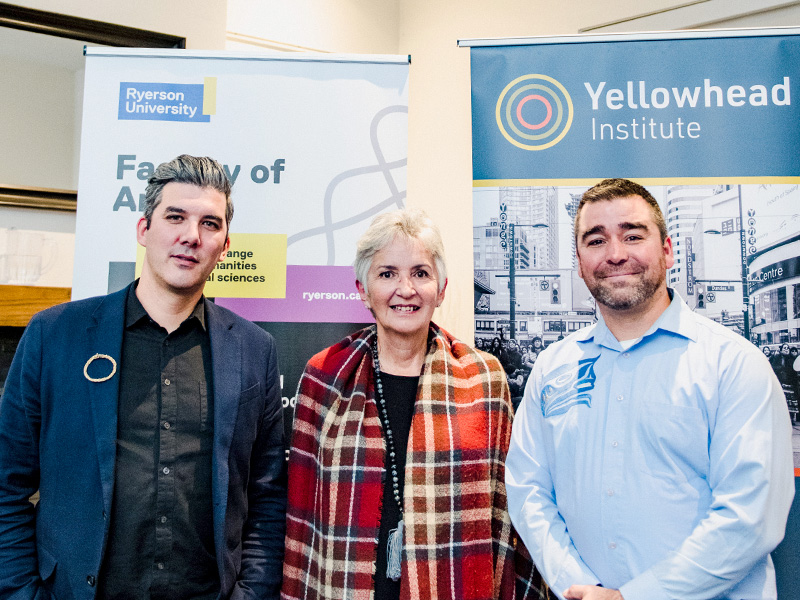New award extends Yellowhead legacy

(Left to right) Hayden King, Beausoleil First Nation (Anishinaabe), Executive Director, Yellowhead Institute; Lori Yellowhead; and Bill McRoberts, Hereditary Chief, Reindeer Clan (Anishinaabe) at the launch of the Yellowhead Institute on October 23, 2018 at Ryerson University.
Thanks to the Yellowhead family, Ryerson has a new award designed to encourage Indigenous students with an interest in Indigenous knowledge or environmental stewardship. The Vernon Yellowhead Award — with a match from the President’s Awards to Champion Excellence (PACE) — will offer two $6,000 awards each year.
The awards are an extension of the Yellowhead family’s generous involvement with Ryerson University. The partnership first began when the university received the family’s blessing to name a new research centre after William Yellowhead — known as Musquakie, or Misko Aki, meaning Red Earth in Anishinaabemowin — the famous Anishinaabe leader of the Chippaweans of Lake Huron and Simcoe from 1817 to 1864. The Yellowhead Institute (external link) is an Indigenous-led think tank focussed on influencing policy related to land and governance, training the next generation of First Nation advocates, academics and leaders, and offering critical and accessible resources for Indigenous communities in their pursuit of self-determination.
“When we decided to name our institute after Musquakie, we first approached his descendants,” says Hayden King, director of the Yellowhead Institute. “The carrier of the Yellowhead name at that point was Vernon, who welcomed me to his community, fed me, shared so many stories about the Yellowhead family, and ultimately granted our request,” he adds. “I very much expected to continue a relationship with Vernon as the Institute grew and evolved, however he passed away on September 18, 2018. After his passing, Vernon's wife Lori created an opportunity to make all this happen. The Vernon Yellowhead Award will materially support at least two Indigenous students a year at Ryerson who will carry on the Yellowhead legacy and remind us always that Vernon's spirit is with us.”
“We were really honoured and Vernon was so proud that the Institute has his name,” says Lori Yellowhead. “Think tanks are responsible for a lot of Indigenous policies and many are focussed on Indigenous issues but don’t express Indigenous views,” she adds. “We greatly appreciate how Hayden has kept us in the loop. This Institute is going to make a difference for future generations. They need a strong voice and Yellowhead is giving that to them.”
Lori adds, “Vernon was big on education and was really keen on environmental issues. We’d go out and pick up garbage on the land for example, and he’d wake me up at the break of dawn to go to Chief Island with him and take water samples to make sure the boats weren’t contaminating the water. His father was also a really strong medicine man, so he wanted to set something up that would preserve the traditional knowledge.”
William Yellowhead (1760-1865) was an Anishinaabe leader in what is now Southern Ontario. His traditional territory covers East Toronto, through Lake Simcoe, and to hunting grounds in Muskoka, Ontario. A British loyalist during the War of 1812, Yellowhead also led his people through some of the most oppressive periods of British colonization. Through it all, Yellowhead strived to defend Anishinaabe jurisdiction against British encroachment. He was an advocate of international Indigenous unity, and preserved Anishinaabe ceremony and medicine, even after adopting elements of Christianity. Yellowhead eventually founded and spent much of his later life on Rama First Nation.
“He knew the white man was coming and he did as much as he could to make sure his people kept some of their land,” says Lori. “He insisted on medical treatment when he signed the treaty and made sure his people had access to doctors as well. He was forward thinking in a time of great adversity — a champion of Indigenous rights when they were being totally bombarded on all sides,” she adds.
The first Vernon Yellowhead Award recipients will be selected this coming fall.
To support the important work of the Yellowhead Institute (external link) , please visit the centre’s online give page.